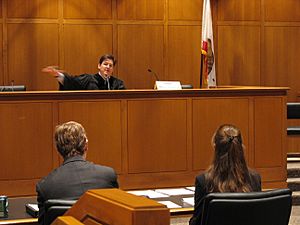Sentence (law) facts for kids
In law, a sentence is the final decision a judge makes after a person has been found responsible for breaking a rule or law. It's like the official outcome of a legal process.
A sentence usually means a person might go to prison, pay a fine (money), or receive other kinds of punishment. This happens to someone who has been found guilty of a crime. The goal of a sentence is to make sure justice is served and to help keep society safe.
Contents
What is a Sentence?
A sentence is the official decision made by a judge in a legal case. It tells what will happen to a person who has been found responsible for a wrongdoing. This decision is very important because it affects the person's future. It also helps to show what happens when laws are not followed.
Why Do Judges Give Sentences?
Judges give sentences for several reasons. One main reason is to make sure people who break laws are held accountable. Another reason is to discourage others from doing similar things. Sentences can also help to keep communities safe by removing people who might cause harm. Sometimes, sentences also aim to help people learn from their mistakes and become better citizens.
Different Kinds of Sentences
There are many types of sentences a judge can give. The most common ones include:
- Prison Time: This means a person has to stay in a special building called a prison for a set amount of time.
- Fines: This is when a person has to pay a sum of money as punishment.
- Community Service: Instead of prison, a person might have to do unpaid work to help the community.
- Probation: This allows a person to stay out of prison but they must follow strict rules and report to an officer regularly. If they break the rules, they might go to prison.
- Restitution: This means the person has to pay money to the victim to cover any damage or losses caused.
How a Sentence is Decided
When a judge decides on a sentence, they look at many things. They consider the seriousness of the wrongdoing and how it affected others. They also think about the person's past behavior and if they have shown regret. Laws often set out a range of possible sentences for different actions. The judge must choose a sentence that fits within these rules and is fair for everyone involved.
See also
 In Spanish: Sentencia (ley) para niños
In Spanish: Sentencia (ley) para niños
 | Claudette Colvin |
 | Myrlie Evers-Williams |
 | Alberta Odell Jones |


